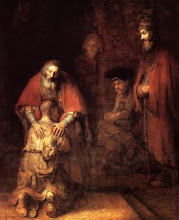 oss down from the top of Skinner's Butte, I'm amazed that the "honor diversity" crowd in Oregon's second most populous city would stand for such a thing. Maybe it has something to do with the fact that the library was renamed the "Knight Library" (funding compliments of Phil Knight, founder of Nike). I can assure you, though, that the "freedom" they suggest emanates from their professors and "higher learning" there is far from the kind of liberty or truth Jesus spoke of in the original context when he was responding to his Jewish followers. That being said, I did discover a set of old, musty books in that library that encouraged me and introduced me to someone I had, up to that point in the early 1980's, never known about
oss down from the top of Skinner's Butte, I'm amazed that the "honor diversity" crowd in Oregon's second most populous city would stand for such a thing. Maybe it has something to do with the fact that the library was renamed the "Knight Library" (funding compliments of Phil Knight, founder of Nike). I can assure you, though, that the "freedom" they suggest emanates from their professors and "higher learning" there is far from the kind of liberty or truth Jesus spoke of in the original context when he was responding to his Jewish followers. That being said, I did discover a set of old, musty books in that library that encouraged me and introduced me to someone I had, up to that point in the early 1980's, never known about : Charles Spurgeon.
: Charles Spurgeon. th the truth enumerated in Romans 1:21-22 ("...but became futile in their thoughts, and their foolish hearts were darkened. Professing to be wise, they became fools...")
th the truth enumerated in Romans 1:21-22 ("...but became futile in their thoughts, and their foolish hearts were darkened. Professing to be wise, they became fools...")Here is an excerpt from one of his sermons ("Christ Precious to Believers"):
“Those who declare that the ancient valor of the church is departed, know not what they say. The professing church may have lost some of its masculine vigor; the professors of this day may be but effeminate dwarfs, the offspring of glorious fathers; but the true church, the elect out of the professing church, the remnant whom God hath chosen, are as much in love with Jesus as the saints of yore, and are as ready to suffer and to die. We challenge hell and its incarnate representative, old Rome herself; let her build her dungeons, let her revive her inquisitions, let her once more get power in the state to cut, and mangle, and burn; we are still able to possess our souls in patience. We sometimes feel it were a good thing if persecuting days should come again, to try the church once more, and drive away her chaff, and make her like a goodly heap of wheat, all pure and clean.”


No comments:
Post a Comment